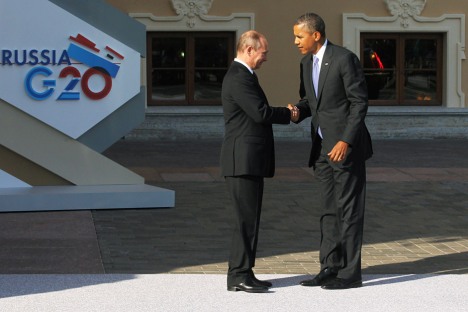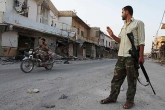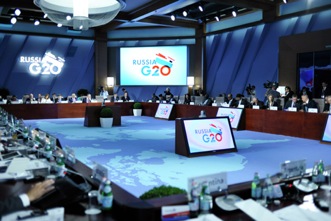Gang of Three feel the squeeze on Syria

A clear sign of the strained relationship between the United States and Russia over Syria were the stiff smiles exchanged by Vladimir Putin and Barack Obama at St Petersburg. Source: Konstantin Zavrazhin / RG
In a sure sign of the changing calculus of global power, an economic forum like the G20 summit in St Petersburg, Russia, has played a key role in deciding Syria’s fate. The summit exposed to the world the near complete isolation of the United States over the deployment of overwhelming force against Syria.
The US State Department said last week that the White House plan for a 60-day strike on Syria – which will undoubtedly reduce the small country to rubble – has the support of nine countries. Support of varying degrees, to be sure.
Among these sidekicks, only Turkey and Saudi Arabia are completely committed and at the frontlines. The rest, including Canada and Australia, are mere followers who are ready to plunge their knives into Syria at Washington’s command.
The standoff over Syria boils down to 15 vs 5 in the G20, with global heavyweights Russia and China on the opposite side being supported by regional powers such as India, Brazil, Indonesia, South Africa, Mexico and Japan. Germany and France are also in favour of taking the matter to the UN.
Accuse first, find evidence later
The United States is vehement – or adamant – that this time it’s nothing like Iraq or Libya. The White House flacks are dishing out “unquestionable evidence” of the use of chemical weapons by Syria. The American line is Bashar al-Assad’s forces carried out a chemical weapons attack last month that killed more than 1,400 people.
However, in the area of presenting evidence, Washington has zero credibility. Flashback to 1991, when a 15-year-old Kuwaiti girl said on American TV that she saw Iraqi soldiers kill new born babies in a Kuwait City hospital. Much later it was discovered she was a liar; she was the daughter of the Kuwaiti ambassador to the United States and was in Washington DC when Iraqi soldiers entered Kuwait. That incident was cited by six American senators as a reason to go to war with Iraq.
Of course the most infamous case was the body of fake evidence concocted in 2003 by the White House dirty tricks department about Saddam Hussein hiding weapons of mass destruction. Former Prime Minister Tony Blair added his two bits too by lying to the British Parliament about Iraq hurtling towards nuclear weapons production.
This time nobody’s buying. As Putin said it would be absolutely suicidal of Assad to use chemical weapons when he’s winning the war.
A clear sign of the strained relationship between the United States and Russia over Syria were the stiff smiles exchanged by Vladimir Putin and Barack Obama at St Petersburg. Normally, at such occasions you see ample displays of man love.
Citing remarks by Jacob Zuma, the South African president, Putin said: “Small countries in today’s world in general are feeling increasingly vulnerable and unprotected. There is an impression any superpower at any moment at its discretion may use force.”
Why a strike will hurt everyone
Related:

Why Russia won’t throw Syria under the bus
Syria needs more BRICS assistance
Russia fulfils its liabilities under arms contracts with Syria
If you want to picture Syria after a US attack, think Libya. Under Muammar Gaddafi, Libya had the highest standard of living in Africa and was one of the world’s leading aid givers. Today, Libya is a shell of a country. Its welfare state destroyed, its modern cities bombed to rubble by NATO – a paradise for Islamic terrorists.
But a military strike on Syria has wider implications. Most G20 leaders fear it would hurt the global economy and push up oil prices, as in 2003 when the US-led invasion of Iraq sent oil prices soaring.
Big oil importers such as India are going to get gobsmacked. Just as Europe and the emerging economies are recovering from a drawn out recession, a new war in the Middle East is the last thing they need.
In fact, the United States, which is the world’s largest oil importer and consumer, could be the most affected. The latest employment data show the country is largely adding temporary jobs, which has been the trend for most of the past year. This is impacting wages across the country and preventing a recovery. More than 50 million Americans are suffering from chronic hunger. A further increase in gas prices will impact their ability to get to food aid centres.
Some gas facts
True to form, the United States and team have looked the other way whenever it has suited them. According to the New Delhi-based Institute of Defence Studies & Analyses, the first to use chemical weapons in the Middle-East were the British.
“Soon after the First World War when the British created the state of Iraq consisting of the three former Turkish provinces of Basra, Baghdad and Mosul; the southern Kurds much to their dislike had been added to the new state of Iraq and in protest broke out in open rebellion.
”Faced with the prospects of a prolonged conflict, with added financial costs and loss of British life; the British decided that the ‘best method’ for putting down the revolt was to use gas. As the then Colonial Secretary, Winston Churchill had remarked, 'I do not understand this squeamishness about the use of gas.'
“The then RAF Chief Hugh Trenchard in a report to the British Cabinet admitted that this was a 'cheaper form of control'. Even the redoubtable Lawrence of Arabia wrote to the London Observer that 'it is odd we do not use poison gas on these occasions'. The poor Kurds were the first to receive the ‘gas’ treatment and as history would prove not the last time!"
Iraq under Saddam Hussein first used chemical weapons against Iranian soldiers on January 13, 1981. IDSA says between December 28, 1980 and March 20, 1984 there were 63 separate gas attacks by the Iraqis. Of course, the United States was aware of this. The US was also aware that chemical weapons were being used against ‘Kurdish insurgents’.
But instead of condemning Iraq, which in Washington’s view was playing a useful role against revolutionary Iran, it provided Iraq with "critical battle planning assistance and satellite data on Iranian military movements".
Mediterranean standoff
Even as Putin argued against a strike on Syria, the Russian Navy has continued preparations in the event of an attack. It has already dispatched four warships to the Mediterranean Sea, including three that passed through the Bosporus on September 5, two landing ships and a destroyer. More ships are on their way.
Although Russia has declared that it “won’t take part in a possible regional conflict” the Middle East is an unpredictable place. Something’s gonna blow!
The real motives for destroying and dismembering Syria are all too well known to be repeated here. Suffice it to say that with Assad out of the way, the country will be balkanised and Sunni terrorists will take control of the crumbs. Iran will lose its only ally in the region and no prizes for guess whose turn it is to be bombed next.
To use an American football term, Russia and China have used a double-team block to slow down the American juggernaut. The question is whether it is enough to stop America’s bomb-first diplomacy in its tracks.
All rights reserved by Rossiyskaya Gazeta.
Subscribe
to our newsletter!
Get the week's best stories straight to your inbox

